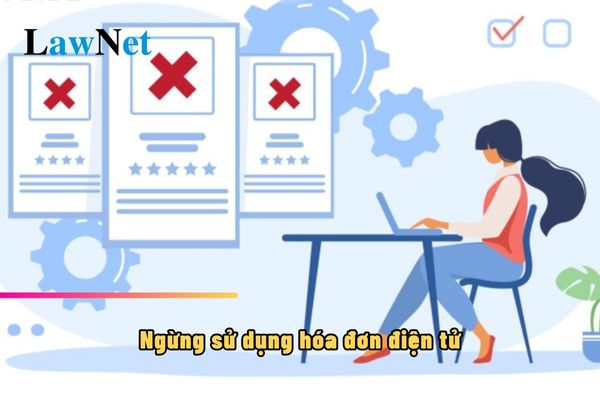Shall an enterprise that does not operate at the registered location in Vietnam have the use of e-invoices suspended?
Shall an enterprise that does not operate at the registered location in Vietnam have the use of e-invoices suspended?
Pursuant to Clause 1, Article 16 of Decree 123/2020/ND-CP, the suspension of e-invoice use occurs in the following prescribed cases:
- Enterprises, economic organizations, other organizations, households, and individual businesses are subject to the suspension of e-invoices with a tax authority code, and suspension of e-invoices without a tax authority code as follows:
+ Enterprises, economic organizations, other organizations, households, and individual businesses terminate the validity of their tax identification numbers;
+ Enterprises, economic organizations, other organizations, households, and individual businesses in cases where the tax authority has verified and notified that they do not operate at the registered address;
+ Enterprises, economic organizations, other organizations, households, and individual businesses that notify the competent state authority of a temporary suspension of business;
+ Enterprises, economic organizations, other organizations, households, or individual businesses have received a tax authority notice regarding the suspension of e-invoices to enforce tax debt recovery;
+ In cases where e-invoices are used to sell smuggled goods, prohibited goods, counterfeit goods, or goods infringing intellectual property rights, which are detected and notified by competent authorities to the tax authority;
+ In cases where e-invoices are issued for the purpose of fictitiously selling goods or providing services to misappropriate money from organizations or individuals, detected and notified by competent authorities to the tax authority;
+ In cases where the business registration authority, or competent state authority requires enterprises to temporarily suspend businesses in conditional business lines when it is discovered that the enterprise does not meet the business conditions as prescribed by law.
Based on inspection, if the tax authority determines that an enterprise was established to illegally trade or use e-invoices, or illegally uses e-invoices to evade taxes, the tax authority will issue a decision to suspend the use of e-invoices; the enterprise will be handled according to the provisions of the law.
Therefore, according to the above regulations, enterprises that do not operate at the registered address are subject to suspension of e-invoice use.

Shall an enterprise that does not operate at the registered location in Vietnam have the use of e-invoices suspended? (Image from the Internet)
What are procedures for suspension of use of e-invoices in Vietnam?
Pursuant to Clause 2, Article 16 of Decree 123/2020/ND-CP, the process for suspension of use of e-invoices is as follows:
- The direct managing tax authority sends a notification to taxpayers falling under points d, e, g of Clause 1 of this Article, requesting taxpayers to explain or supplement information and documents related to the use of e-invoices.
- Taxpayers are required to explain or supplement information and documents within no more than 02 working days from the date the tax authority issues the notification. Taxpayers can come directly to the tax authority to explain or supplement information and documents in writing.
- Taxpayers continue to use e-invoices or provide additional explanations, specifically:
+ If taxpayers have fully explained or supplemented information and documents proving the lawful use of e-invoices, they may continue to use e-invoices.
+ If taxpayers have explained or supplemented information and documents, but cannot prove the lawful use of e-invoices, the tax authority continues to notify taxpayers to supplement information and documents. The deadline for supplementation is 02 working days from the date of the notification.
- If after the deadline specified in the notification, taxpayers do not provide an explanation or supplement information and documents, the tax authority will issue a notification requesting the taxpayer to suspend the use of e-invoices with or without a tax code and take actions according to regulations.
- Enterprises, economic organizations, other organizations, households, and individual businesses stated in Clause 1, Article 16 of Decree 123/2020/ND-CP may continue using e-invoices after notifying the tax authority of the continued business or when the tax authority restores the tax identification number, or when the tax authority issues a decision to terminate the effect of the decision to enforce administrative tax management decisions by suspending the use of invoices or upon notification from competent authorities.
- In cases where enterprises, economic organizations, other organizations, households, or individual businesses are in the period of temporary business suspension and need e-invoices for existing contracts signed before the business suspension date, they may use e-invoices issued for each occurrence as instructed in Clause 2, Article 13 of Decree 123/2020/ND-CP.
What are the principles of e-invoice management in Vietnam?
According to Article 90 of the Law on Tax Administration 2019, the principles of e-invoice management are as follows:
- When selling goods or providing services, the seller must issue an e-invoice to deliver to the buyer in the standard data format and must fully record the contents as prescribed by tax law and accounting law, regardless of the value of each transaction.
- If the seller uses a cash register, the seller must register to use e-invoices generated from a cash register connected to the tax authority via e-data transfer.
- The registration, management, and use of e-invoices in the sale of goods and service provision must comply with the provisions of e-transaction law, accounting law, and tax law.
- The issuance of tax authority codes on e-invoices is based on information established on invoices by enterprises, economic organizations, other organizations, households, and individual businesses.
Enterprises, economic organizations, other organizations, households, and individual businesses are responsible for the accuracy of information on invoices.

